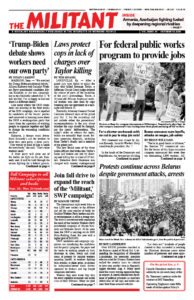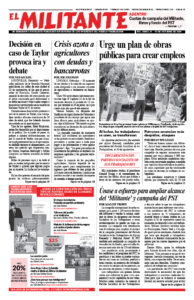October 23, 1995
JOHANNESBURG, South Africa — “Cubans came to our region as doctors, teachers, soldiers, agricultural experts, but never as colonizers,” said South African president Nelson Mandela at a Cuba-Southern Africa solidarity conference here. “They have shared the same trenches with us in the struggle against apartheid. Hundreds of Cubans have given their lives. We vow never to forget this unparalleled example of selfless internationalism.”
Hundreds of thousands of Cubans served on internationalist missions in Angola from the mid-1970s to the late 1980s. Cuban volunteer troops helped defeat successive invasions by South Africa’s apartheid regime.
The apartheid army was dealt a military defeat at Cuito Cuanavale in 1987 and was driven out of Angola. The outcome gave another impulse to the battle against apartheid inside South Africa.
October 23, 1970
President Richard Nixon’s Oct. 7 “peace” proposal in no way signals a shift in Washington’s military or political objectives in Southeast Asia. Nixon’s proposal is designed to deceive the American people and to give the appearance of an attempt to end the war.
The near-unanimous support from Democratic and Republican party politicians emphasizes the importance of massive turnouts for the Oct. 31 demonstrations to demand immediate withdrawal of all U.S. troops.
Washington’s aim is to crush a popular revolution in Vietnam, to stabilize a pro-imperialist regime in Saigon, and to maintain a military foothold in South Vietnam. Twin opposition of the liberation fighters in Indochina and the antiwar forces in this country has dictated the step-by-step, “peace plan” by “peace plan” character of Washington’s maneuvers throughout the war.
October 20, 1945
LOS ANGELES, Oct. 11 — Police, who yesterday morning arrested hundreds of unarmed pickets at Warner Bros. Burbank studio, retreated in confusion today when at six a.m. sharp the first contingent of a mighty wave of thousands of Lockheed workers drove up dramatically and with flags flying joined the pickets.
Some 500 police, who had previously taken up positions in the middle of the street, stepped back and retreated to the opposite curb. They made no move to stop the procession.
Lockheed machinists, after demonstratively driving past Warners’ studio, parked their cars and in columns four abreast marched back to join the other pickets. The singing, militant marchers were hailed by those on the line with shouts, whistles and applause. By seven o’clock, more than 2,500 sympathizers from Lockheed had joined the pickets.

